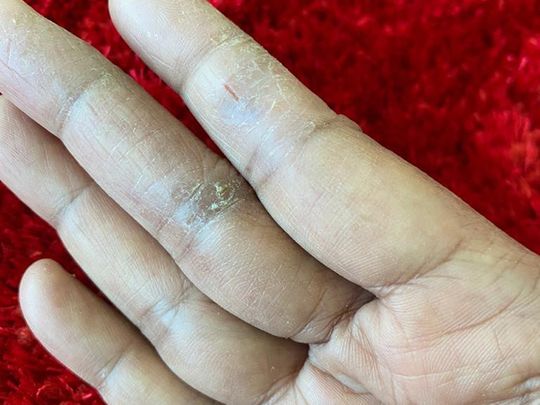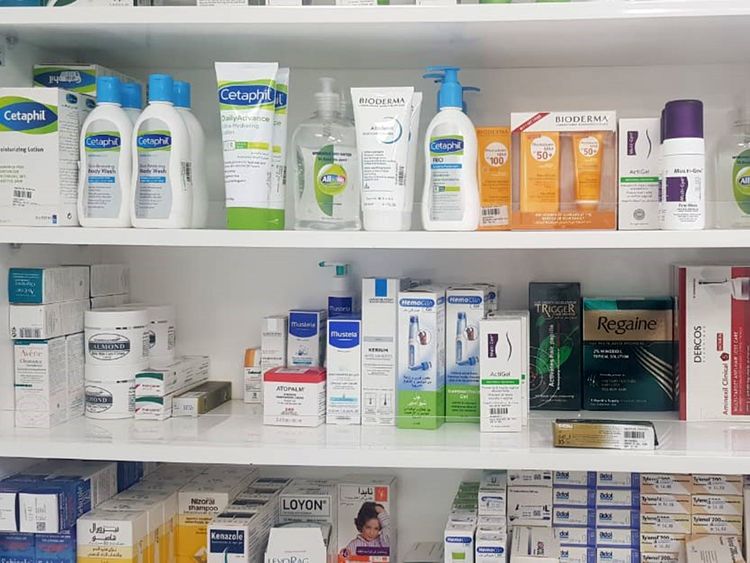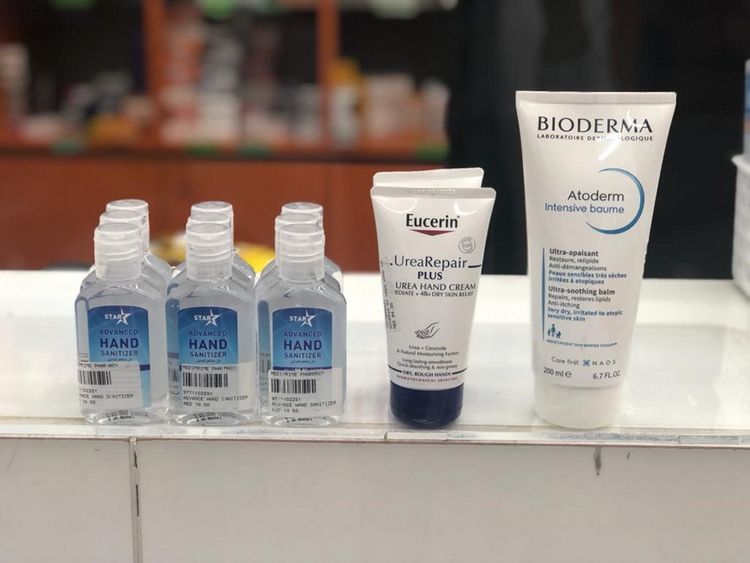
Dubai: Ever since the COVID-19 pandemic started, Jamila H, 36, a senior marketing professional has been struggling with skin rashes and allergies as frequent hand wash and use of sanitisers have caused a flare up of a host of skin problems.
Her hands are raw, dehydrated, with split dry skin on her palms and fingers that makes it difficult for her in a professional situation. She told Gulf News: “Ever since the pandemic started, I have been faithfully following the hand sanitising and washing protocol along with face mask and social distancing. I have a sensitive skin and my problem has gotten worse with each passing day.”
Outbreak of rash and allergy
Jamila has been using an extra dollop of moisturiser but has not been able to manage the severe outbreak of rash and allergy. “It has become a routine for me every night to apply creams and moisturisers before bed to ease the itching and pain on my hands. With my kind of skin, which has frequent breakouts, I have always been careful to keep away from chemicals, detergents, washing liquids but there is no escape from hand sanitisers and in the last few months despite all precautions I have been suffering a lot with allergies on the skin of my palm and fingers. When outside I have had to depend on the use of sanitisers, which I avoid if I am home or at the workplace. I always opt for hand washing. I hesitate to show my hands to people, especially my right hand. I cannot use nail polish too and am dreading the winters as with the use of strong alcohol based sanitisers my skin will develop more rashes and bleeds,” said Jamila, who used generous doses of Vaseline and wears gloves when working with her hands.
Eczema on the rise too
Jamila is not the only one. According to doctors from UAE’s #livingwitheczema network, a nationwide initiative launched to educate people on the rise of atopic dermatitis, commonly known as eczema.
But Dr Khadija Aljefri, a board member of the Emirates Dermatology Society, said that although there has been a rise in complaints of skin rashes, allergies, bleeding and itching owing to the overuse of strong alcohol-based sanitisers, even those with eczema were reporting flare-ups. Dr Al Jefri said: “All rashes are not eczemas doctors say, the current pandemic situation has triggered flare-up of atopic dermatitis among existing patients while many other are dealing with a wide range of skin rashes and allergies on the hands. If the case is eczema, it is accompanied by asthma, spring allergy, and sinuses (nasal polyps), and these are all symptoms of eczema, especially asthma.”
Dr Khadijah Aljefri
Recently, a live video session held by the #livingwitheczema network where Aljefri, and Dr Anwar Al Hammadi, President of Emirates Dermatology Society, answered numerous queries of residents to do with outbreak of eczema.
Dry hands
Confirming the outbreak, Dr Al Hammadi said: “Due to the spread of COVID-19 pandemic, the increasing use of sterilises leads to dry hands and thus irritation of eczema, and we advise those with the disease to reduce the use of sterilises if they are not forced to. We call on everyone to use a moisturiser immediately after washing hands or using a sanitiser.”
Dr Anwar Al Hammadi
Responding to the demand for moisturisers, many pharmacies now have the shelf for creams and moisturisers adjacent to the shelf for hand sanitisers as though the two complement each other. Dr Heba Rashad, Group Pharmacy Manager for Mediprime Pharmacies told Gulf News: “Most people who come to buy good hand sanitisers with above 70 per cent alcohol content as is recommended for use during the COVID-19 pandemic, also buy moisturising creams with it. “It is possible to be allergic to ingredients in hand sanitiser or using it too much alcohol-based sanitiser could trigger dryness and itchiness on hands."
Dr Heba Rashad
"Using a good hypoallergenic moisturiser can minimise the damage as it locks the moisture in the skin and prevents dehydration. So in Mediprime pharmacies we are displaying hand sanitiser with the moisturiser to treat simple allergic reaction. But if there is sever dryness or eczema the patient should consult the physician,” added Dr Rashad
Who is at risk?
According to Dr Majd Alzoughbi, Specialist Dermatology at the Aesthetica Clinic, Jumeirah, there has been a steady rise of patients coming in with complaints of rashes, itching, scaly skin, and dryness of hands ever the COVID-19 pandemic began. “While patients of chronic atopic dermatitis which has a genetic component to it, have been complaining of flare-ups what we see in our clinics is non-eczema patients complaining of rashes, sores, allergies and bleeding owing to the frequent use of hand sanitisers,” she said.
Dr Majd Alzoughbi
Dr Alzoughbi said the new patients she had were diabetics and patients with sensitive skins. “Such patients have a natural lack of urea and ceramides which trap moisture in the skin. ‘While sanitisers are high on alcohol for the disinfecting effect, it is advised to select sanitisers which do not have strong chemicals like phthalates that are used for artificial fragrance that is harmful. It is advisable to use hand sanitisers only where soap and water is not available and to use a good hypoallergenic cream containing urea and ceramides immediately after use of sanitisers to trap moisture below the skin surface to avoid dehydration,” she advised.
Dos and don’ts to avoid skin rash and allergies with overuse of hand sanitisers
• Keep your hands clean and dry at all times. Avoid the use of gloves except in high infection zones as gloves can trap infection on its surface.
• Wherever possible carry a good hypoallergenic moisturising soap with a bottle of water to wash hands. Minimise the use of sanitisers. If one can carry a bottle of sanitiser it is also possible to carry liquid soap and water reason skin specialists.
• Dab the hand with a soft muslin cloth after washing and avoid rubbing with a rough towel.
• Use a good moisturiser as soon as hands are washed or sanitised
• If you experience flaky, cracked skin accompanied with itchiness, odour and oozing of blood and pus on the skin of your hands, please consult a doctor. A dermatologist will prescribe non-steroid treatment first that contains urea and ceramide.
• If that does not work only then will a steroid based cream be used only under a doctor’s supervision. Steroid creams and the strength they are to be used in, are prescribed only by a certified medical skin specialist and used in a tapering dose, for a short while to control flare-ups.
• Keep your immune system strong with a health and active lifestyle to stem any kind of allergy
• Eat large portions of fresh vegetables and fruits and nuts to get your daily dose of micronutrients and anti-oxidants
• Avoid nuts like chestnuts, walnuts, peanuts and fruits like strawberry and foods like eggs or shrimps if you suffer from a predisposition to skin rashes or allergies as these have a potential to trigger allergies
• Avoid showers as these are drying and opt for a soak. Avoid frequent baths and when one does moisturise body well before going in for a tepid water soak.
• Avoid use of scrubs and exfoliants which can be dehydrating and do not rub hard when drying the body. Use a soft towel to gently dab
• Have multivitamins like zinc, vitamin A and B5 that build natural immunity and are good for skin health.
• Cut out oily food, drink lots of water and have suitable proteins
Source: Dr Majd Alzoughbi


















